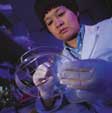 Tackling
Breast Cancer "It supports the idea that if you have c-jun in a cancer cell, it could be a drug target for those tumors that have it as a basis of the mutation," Wisdom said. Chen comes to UC Davis from the Salk Institute for Biological Studies in San Diego, where he was a postdoctoral researcher. Enthusiastic about the clinical implications of his research, Chen is zeroing in on how the hormone estrogen binds to receptors and how those receptors turn on the engine of gene transcription. Estrogen fuels breast cancer cell growth, as testosterone spurs prostate cancer. Clinicians often treat these cancers with hormone therapy, drugs that block estrogen or testosterone from binding to receptors, which arrest cancer growth. But, at some point, this hormone blockade therapy stops working and the cancer progresses. "We are trying to understand exactly what happens when this occurs," said Chen, an assistant professor of biological chemistry. "This is where the basic science kicks in." For the past 10 years, scien- tists had a cut-and-dried theory that explained the biological basis for breast and prostate cancer: the hormone receptor binds to the hormone and acts as the engine within that cell to turn on genes that control cell growth. But now, a new theory has arisen.
Home |
Table of Contents |
To our Readers |
Building on Basics UC Davis Health System | © 2000, 2001, 2002 UC Regents. All rights reserved. |
Postdoctoral fellows in Cheněs lab collect cells grown on a plate for a functional analysis of the genes. |

